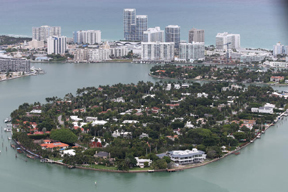 WASHINGTON: The Treasury Department will begin tracking sales of high-end real estate in two of the country’s most expensive markets -Miami and Manhattan – to try to crack down on money laundering.
WASHINGTON: The Treasury Department will begin tracking sales of high-end real estate in two of the country’s most expensive markets -Miami and Manhattan – to try to crack down on money laundering.
The department’s Financial Crimes Enforcement Network said it will temporarily require certain title companies to identify individuals behind companies that buy properties exceeding $3 million in these two markets with all-cash transactions.
The government said it’s concerned that some of these real estate deals are made by corrupt foreign government officials or international criminals who use expensive real estate to launder dirty money. By using holding companies, some buyers may be able to disguise their identities.
The disclosure requirements would apply for 180 days beginning in March, according to the announcement. Under federal law, the government can demand these geographically targeted disclosures for up to six months but can then seek an extension.
High-end home prices in both Manhattan and Miami have soared over the past year. The median Manhattan home sold for $1.15 million at the close of 2015 _ a 17.3 percent leap from a year ago, according to the real estate brokerage Douglas Elliman.
That price put it at highs last glimpsed before the financial crisis erupted in 2008. The median sales price for a luxury unit in Manhattan was $6 million, a 25 percent jump from a year ago. Nearly half the purchases were all-cash.
Douglas Elliman reported that the entry point for luxury single-family homes in Miami Beach exceeds $6 million. Buyers are also flocking to the chic condo towers that increasingly line the area’s most expensive avenues.
Of the $100 billion spent on real estate transactions in Florida last year, nearly a quarter came from international buyers, according to the National Association of Realtors. And 74 percent of those sales were all-cash. But most of those purchases would not qualify for the additional government disclosure because they’re priced less than $3 million.
The housing industry is trying to gauge the impact of the required disclosures.
“It’s painting the high-end segment as having overall treachery, and that’s unfortunate,” said Jonathan Miller, chief executive at the appraiser Miller Samuel. “It’s certainly not helpful to the high end of the market because it adds another level of complication to a transaction.”
Still, Miller said the impact is likely to be minor in the long term.
Real estate developer Kevin Maloney, founder of Property Markets Group, which has built in New York, Miami and Chicago, said he doubts that the announcement will affect sales. He said that about 60 percent of his buyers use a corporation but that that choice isn’t because of any nefarious intentions.
“People who are buying in the luxury sector want privacy, want anonymity,” Maloney said. “We generally know our buyers because they come in, and they interface with us.”
The title insurance industry, which will be required to identify buyers and report the information to the government, worked with the Treasury Department in developing the new rules.
The title insurance firms are described as the independent third party at the closing table with buyer and seller. The industry has nearly $9 billion in total assets.
Title companies will implement the government order “to help prevent money-laundering schemes and the illegal purchase of real estate in the United States,” Michelle Korsmo, CEO of the American Land Title Association, said in a statement. -AP






